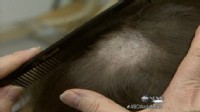Young men who took Propecia for hair loss and experienced its sexual side effects also had high rates of depressive symptoms, even after stopping the drug, a retrospective study found.
Among a group of men who developed persistent sexual dysfunction that continued for at least three months after they stopped taking Propecia, 75 percent reported symptoms of depression compared with 10 percent of controls who never took the drug, according to Dr. Michael Irwig of George Washington University in Washington, D.C.
The symptoms were moderate-to-severe in 64 percent of the former Propecia users and in none of the controls, Irwig reported online in the Journal of Clinical Psychiatry.
Read this story on www.medpagetoday.com.
Propecia has been a popular treatment for male-pattern baldness, and sexual side effects identified during clinical trials appeared to resolve on withdrawal of the treatment.
However, emerging evidence has shown that in some men the adverse effects persist, and the FDA recently amended the drug's labeling to reflect greater concern about these problems.
Recent uncontrolled studies also have suggested a possible link between the drug, a 5-alpha-reductase inhibitor, and depression.
To clarify this possibility, Irwig recruited a cohort of 61 men in whom sexual adverse effects persisted for three months or more after treatment ended, along with a control group of 29 men with hair loss but no Propecia exposure and no psychiatric conditions.
Mean scores on a depression inventory were 23.67 among men who had been treated with Propecia and 5.93 among controls.
A total of 39 percent of the former finasteride users reported having thoughts of suicide, and 5 percent agreed with the statement, "I would like to kill myself."
In contrast, only one of the controls reported suicidal thoughts.
The potential connection between depression and sexual dysfunction is complicated by the possibility that either can lead to the other.
However, there is little in the published literature about depression associated with sexual dysfunction in young men; most studies have focused on older men with erectile dysfunction.
Furthermore, the drug could independently contribute, the researcher suggested.
"A plausible biological mechanism to explain the association between [Propecia] and depression lies with neuroactive steroids, neuromodulators that are synthesized in the central nervous system itself and that are also transported to the brain from the gonads and adrenal glands," he explained.
Propecia can cross the blood-brain barrier. In the brain, it blocks the action of an enzyme that alters the levels of hormone-derived neuroactive steroids, including a metabolite that can bind to receptors for the gamma-aminobutyric acid (GABA) neurotransmitter system, which has been implicated in anxiety and depression.
"Although the effects of [Propecia] in the human brain are poorly understood, clinicians, as well as potential [Propecia] users, should be aware of the serious potential risks of this medication, especially as it is being used cosmetically to alter a normal age-related process," Irwig concluded.
Limitations to this "pharmacovigilance study" included possible selection bias, recall bias, and its retrospective nature. Also, BDI-II is not a diagnostic tool and cannot substitute for a psychiatric evaluation.
Still, men who report persistent sexual difficulties after taking [Propecia] should consider being screened for depression, and further controlled studies should be done, Irwig advised.




No comments:
Post a Comment